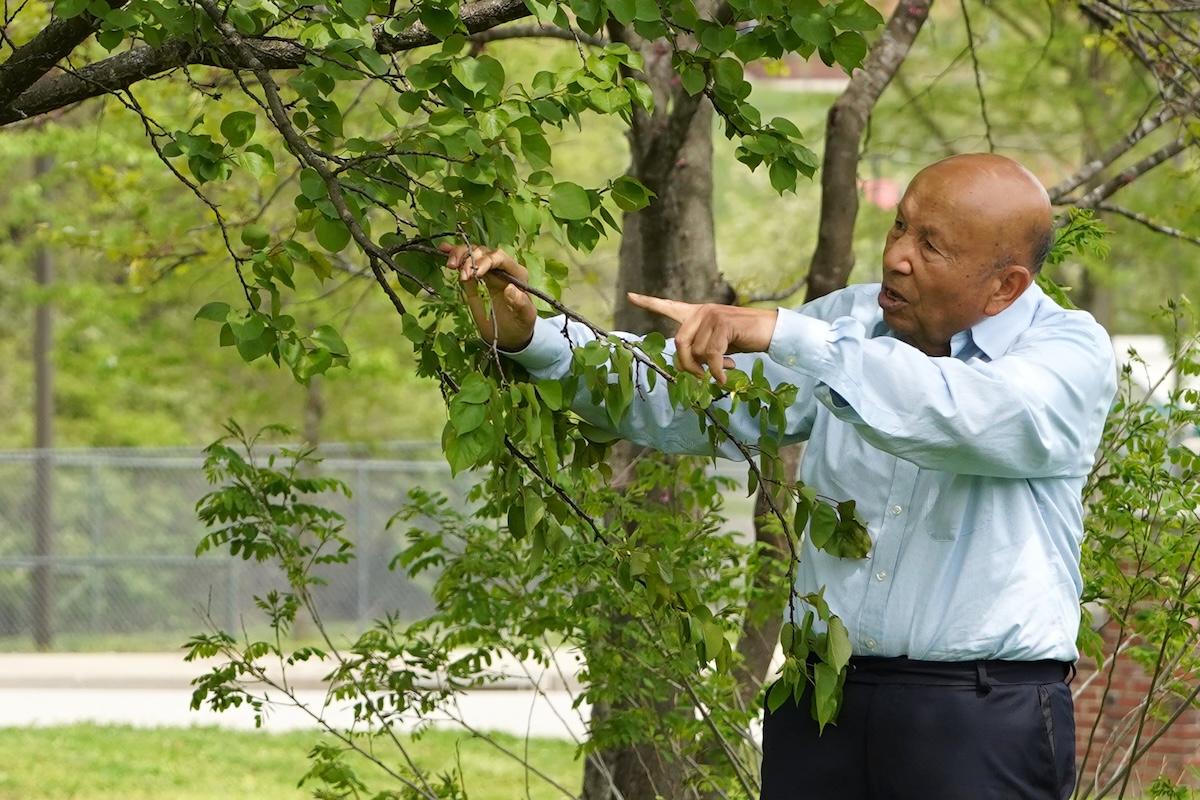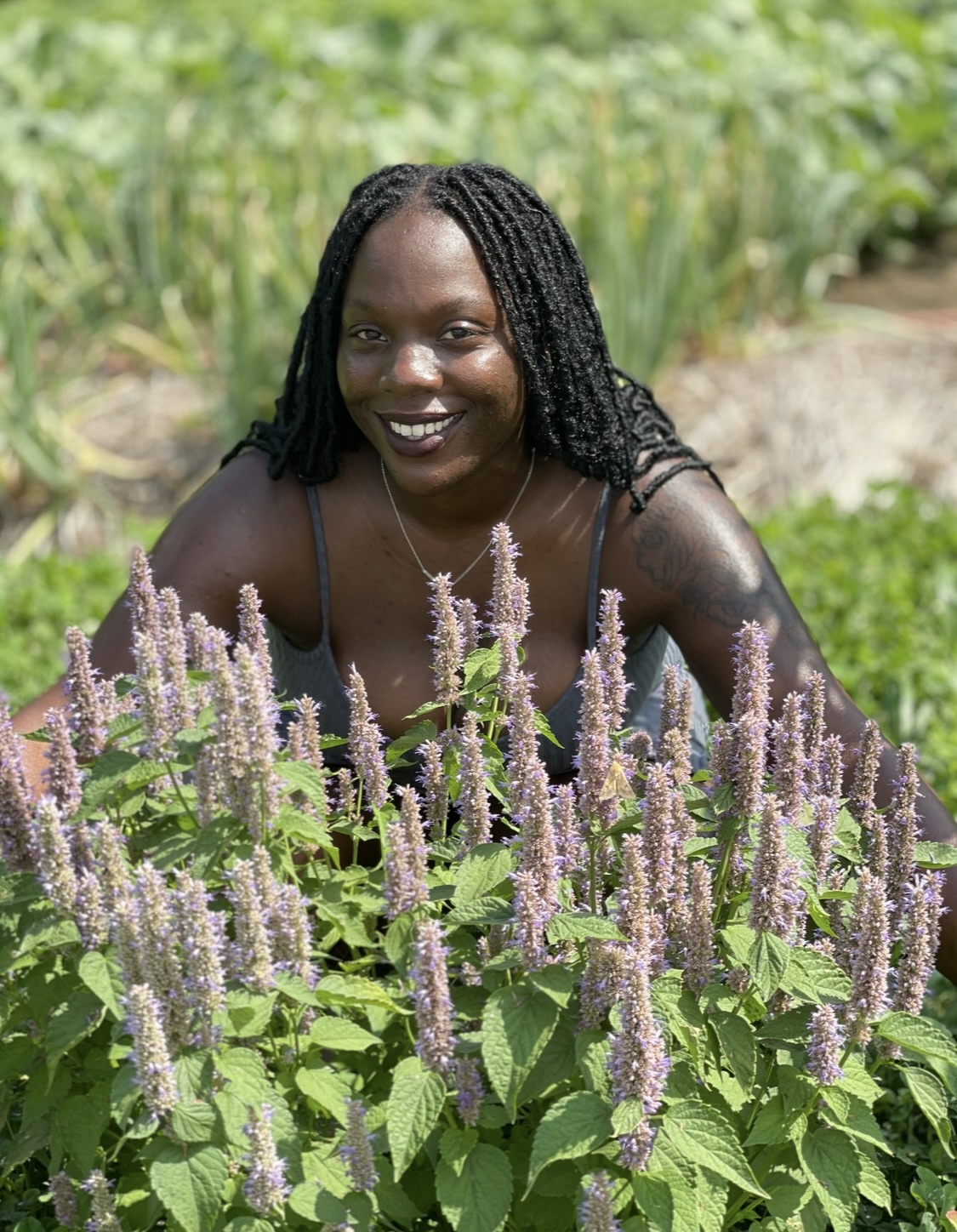Laying the Groundwork: ISFOP Prepares Growers for the Season Ahead
Office of Communications and Marketing
Young Hall
820 Chestnut Street
Jefferson City, MO 65101
 Dr. Giuma Abusrewil demonstrates proper pruning techniques at Lincoln University’s campus.
Dr. Giuma Abusrewil demonstrates proper pruning techniques at Lincoln University’s campus.
Strong seasons start with smart preparation. In the months leading up to spring, Lincoln University’s Innovative Small Farmers’ Outreach Program (ISFOP) worked closely with farmers and gardeners across Missouri to lay the groundwork for healthy, productive harvests. The program supports small-scale and historically underserved growers and producers by offering early guidance on everything from seed starting to soil health — helping ensure a successful year in the field and garden.
For many growers, early planting preparation begins indoors, explained Julia Thompson, ISFOP farm outreach worker stationed in east central Missouri.
“Early planting preparation can begin as early as January, starting indoors with seeds and planning for the season ahead,” Thompson said. “It’s important to provide seeds with the right soil temperature and moisture to help them germinate and grow strong for transplanting later on.”
Penny Wilson, ISFOP farm outreach worker in southeast Missouri, also highlighted the importance of early seed starting and shared how she supported farmers this season. She assisted a farmer by starting dozens of plants indoors, helping to reduce costs and ensuring the plants would be strong and ready for transplanting after the final frost.
Thompson stressed the importance of respecting planting zones and frost dates when planning to transplant outdoors. She encouraged growers not to rush planting, noting local planting guides can help farmers and gardeners time their crops more reliably.
“There’s a reason those frost dates and zones exist,” she said. “They come from generations of experience. Sticking to them protects your investment — food for yourself, your family and your community.”
According to Thompson, those looking to get a head start should focus on cool-season crops, such as leafy greens and root vegetables. She pointed to hardy options like spinach, kale, collards, brassicas and beets as strong candidates for early planting. Wilson also emphasized that lettuce, cabbage and broccoli tend to perform well during this early window, particularly when soil conditions allow for direct sowing outdoors.
 Julia Thompson, an outreach worker with ISFOP, smiles beside a healthy patch of anise hyssop — a pollinator-friendly herb known for its fragrant purple flower spikes and minty aroma.
Julia Thompson, an outreach worker with ISFOP, smiles beside a healthy patch of anise hyssop — a pollinator-friendly herb known for its fragrant purple flower spikes and minty aroma.
While soil conditions might seem ready, growers still face the challenge of unpredictable spring weather. Thompson cautioned that sudden drops in temperature can wipe out early crops if farmers and gardeners move too fast.
“April is tricky — it’s always beautiful and rainy, and we’re eager to plant, but then that frost hits,” Thompson said.
To protect early plantings, she encouraged using row covers or creating small microclimates to help retain warmth during cold snaps.
When asked how to prepare the soil before planting, Thompson emphasized the importance of rebuilding and feeding the soil each year. Instead of relying on expensive store-bought soil, she recommended improving soil health naturally by adding compost, horse manure, leaves, wood chips and other organic materials, ideally starting in the fall. Thompson explained that building rich, well-structured soil helps seeds germinate more easily and gives young plants a stronger start.
Wilson warned that soil needs to drain well to support healthy growth. Some farms she works with have fields that flood easily, while others dry out too fast. Wilson also encouraged farmers and gardeners to test their soil before planting. Through soil testing services, growers can identify nutrient needs and make informed decisions about adjustments. She explained that testing in late fall or early spring gives farmers enough time to adjust their soil before planting begins.
Additionally, Thompson is assisting with soil testing workshops this season to help farmers assess their soil health and make informed decisions for stronger planting success.
ISFOP’s early-season support also extends to farmers interested in growing fruit trees and establishing orchards. Dr. Giuma Abusrewil, ISFOP farm outreach worker based in central Missouri, explained that timing is crucial when planting fruit trees at the start of the season.
“Many trees like apples, pears and plums need a certain number of chilling hours — typically between 32 and 45 degrees Fahrenheit — before they can break dormancy and bloom properly,” Abusrewil said. “During this time, bare-root trees must also be protected from freezing temperatures. Planting too early or exposing young trees to late frosts can severely damage buds and reduce future harvests.”
He advised growers to monitor weather patterns closely and plant bare-root trees while the trees are still dormant in early spring. Bare-root trees, which are sold without soil around their roots, need to be planted before new growth begins to ensure a healthy start.
As part of early orchard preparation, Abusrewil emphasized that pruning is a critical first step in setting up healthy fruit trees for the season. Strategic pruning removes dead wood, water sprouts and poorly angled branches, helping young trees develop strong, balanced structures.
“Pruning in late winter or early spring before new growth begins helps shape young trees, improve sunlight exposure and reduce the risk of disease,” said Abusrewil.
Beyond planting and pruning, he stressed the importance of understanding soil and water conditions before establishing an orchard. Fruit trees require well-drained, aerated soil to support strong root systems. Poor drainage or waterlogged conditions can suffocate young trees, leading to long-term losses. Before planting, he recommended farmers assess their land carefully to avoid hidden challenges below the surface.
With the final frost dates now passed across Missouri, farmers and gardeners are moving fully into the growing season. For those seeking more information on future gardening workshops or support through Lincoln University’s Innovative Small Farmers’ Outreach Program (ISFOP), please contact Dr. Mark Lucas at LucasM@LincolnU.edu.
